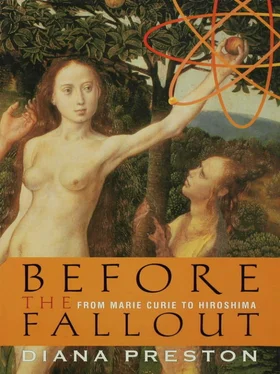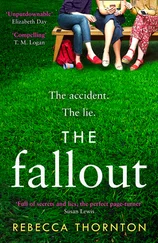• • •
Denmark’s eight thousand Jews were, for the most part, still living unmolested. At this stage in the war, the Germans were treating the Danes with care, anxious not to provoke resistance on their doorstep while their forces were busily—and successfully—engaged elsewhere. Denmark was allowed a degree of automony, and Niels Bohr and his Institute for Theoretical Physics were permitted to function relatively normally. On the surface life went on. However, as one Nazi propagandist observed, “A feeling of quiet rage prevails here, which only comes to the fore when the Danes believe themselves alone and unobserved.” If the Germans did observe overt dissidence, they dealt with it mercilessly. Just before Heisenberg arrived in the city, a group of Danish communists and other known opponents of the Nazis had been deported to Germany.
Despite repeated encouragement from Allied agents to escape, Bohr stayed, determined to protect his institute and the people in it. However, as he must have known, his position was precarious. His name had long been in Gestapo files, not just as a prominent scientist who was half-Jewish but because he had spoken out against Nazi ideology. At an international congress on anthropology on the eve of the war, he had denounced prejudice and argued that “different human cultures are complementary to each other.” He had spoken feelingly of the “unlimited richness and variety” of human life, at which point the German delegates had walked out.
Bohr refused to attend Heisenberg’s lecture. Heisenberg, however, lunched several times at Bohr’s institute with Bohr’s staff and, according to a postwar account by Bohr’s assistant, the Polish émigré Stefan Rozental, appeared to feel little awkwardness about being in occupied Copenhagen. He “spoke with great confidence about the progress of the German offensive in Russia” and stressed “how important it was that Germany should win the war.” While regretting the occupation of Western countries like Denmark and Holland, he had no doubt that German rule was “a good development” in eastern Europe “because these countries were not able to govern themselves.”
Bohr was, however, clearly prepared to welcome Heisenberg privately as an old friend and as the man his sons thought of as their German uncle. But their reunion inevitably took place against “a background of extreme sorrow and tension for us here in Denmark,” as Bohr later wrote. The two met and talked at the institute and may have dined together at Bohr’s house, although accounts conflict. They certainly went for a walk, probably to frustrate Gestapo surveillance, and it was then that their critical discussion seems to have taken place. The risks of discovery were too great for either man to commit anything to paper at the time. Any reconstruction of the meeting therefore relies on explanations and interpretations made many years later in a world where the atom bomb had been dropped and the full scope of Nazi atrocities revealed—a world where Heisenberg was anxious to distance himself from the Nazis, while Bohr’s anxiety about the cold-war arms race may have influenced his memories.
Heisenberg’s first written account of what happened was in a letter of 1948 to a Dutch friend. He recalled that he had asked Bohr whether a physicist had a moral right to work on problems in atomic physics relevant to the war. Bohr, in turn, had asked Heisenberg whether military applications of atomic power were feasible. When Heisenberg replied that they were, Bohr’s apparent response was that a mobilization of physicists on both sides was unavoidable and therefore justified. Heisenberg believed that Bohr thereby dismissed his implicit suggestion that physicists of the world should band together against their governments.
Heisenberg provided a more detailed account of the meeting in a letter to the writer Robert Jungk in the 1950s. Before launching into his version of events in Copenhagen, he summarized the state of German fission research in the autumn of 1941. First, German scientists believed it was possible to build a reactor that could generate energy. Second, although they had not yet solved the problem of separating U-235, they knew that they could produce plutonium, which could, in turn, be used to fuel a bomb. However, this could only be accomplished in “huge reactors” that would have to operate for years. The production of bombs was therefore possible only with “enormous technical resources.” Heisenberg believed that this requirement put scientists in a “favourable” position. Had bombs been easy to make, physicists “would have been unable to prevent their manufacture.” Instead, they could play a decisive role by deciding what advice to give their governments. They had two choices: to say “that atomic bombs would probably not be available during the course of the war” or to say that “there might be a possibility of carrying out this project if enormous efforts were made.” It was against this background that he had gone to Copenhagen to seek out Bohr.
Heisenberg claimed, in his letter to Jungk, that he opened the discussion by asking Bohr whether he believed it was right in time of war for physicists to devote themselves “to the uranium problem—as there was the possibility that progress in this sphere could lead to grave consequences in the technique of war.” Heisenberg realized from Bohr’s “slightly frightened reaction” that he had immediately understood what Heisenberg meant. As Heisenberg recalled, the Dane responded by asking, “Do you really think that uranium fission could be utilized for the construction of weapons?” According to Heisenberg, he “may have replied: ‘I know that this is in principle possible, but it would require a terrific technical effort, which, one can only hope, cannot be realized in this war.’” Bohr was “shocked,” assuming that Heisenberg had “intended to convey to him that Germany had made great progress” toward atomic weapons. Heisenberg tried to correct this false impression but could not.
In his later memoirs Heisenberg dealt more briefly with the Copenhagen meeting, but the same leitmotifs appear: his attempt to raise the moral dimension with Bohr, his admission that atomic weapons were possible but only with “a tremendous technological effort,” and his insistence that scientists were in a pivotal position, able to “advise their governments that atom bombs would come too late for use in the present war, and that work on them therefore detracted from the war effort, or else contend that, with the utmost exertions, it might just be possible to bring them into the conflict.” Once again, he claimed Bohr was too shocked to take in what he was saying. Heisenberg left Copenhagen knowing that his mission had failed. He blamed himself for having spoken too guardedly because he was afraid for his life. Had he had been more explicit, Bohr would have understood him. Bohr’s picture of Heisenberg’s visit—which his wife, Margrethe, later unequivocally described as “hostile”—was quite different. He was immediately struck by something peculiar in Heisenberg’s demeanor, and their meeting deteriorated rapidly. Bohr’s earliest account is reported in a letter written in 1946 by the American physicist Rudolf Ladenburg, who repeated Bohr’s comments that Heisenberg had expressed the “hope and belief” that if the war lasted long enough, atomic weapons would give Germany victory.
Nearly a decade later, when Bohr read Heisenberg’s account of events, reproduced in Robert Jungk’s book, he was shocked and angered. In a recently released letter to Heisenberg, drafted but never sent and discovered tucked into Bohr’s copy of Jungk’s book after Bohr’s death in 1962, Bohr wrote, “I am greatly amazed to see how much your memory has deceived you.” He taxed Heisenberg with expressing the “definite conviction that Germany would win” and that it was “therefore quite foolish for us to maintain the hope of a different outcome of the war and to be reticent as regards all German offers of cooperation.” He also remembered “quite clearly” that Heisenberg spoke in a manner that could only give Bohr “the firm impression” that under his leadership “everything was being done in Germany to develop atomic weapons.” Furthermore, Heisenberg had said that “there was no need to talk about details [of atomic weapons]” since Heisenberg was “completely familiar with them and had spent the past two years working more or less exclusively” on them.
Читать дальше












